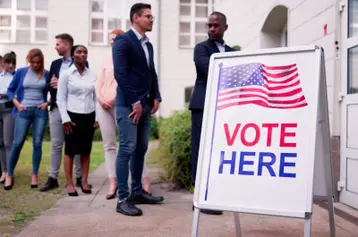
Elections are already underway this year, with over 150 million people expected to cast a ballot at the federal, state, and local levels this November. This article is meant to offer inspiration and ideas of how you can provide your employees with access to information and materials that help to educate and excite them about performing their civic duty of voting.
Keep efforts inclusive: The idea is to encourage employees to take advantage of their freedom to vote, not to sway how they vote. Focus on nonpartisan activities and civic engagement. For example, encourage employees to complete a voting plan. A voting plan identifies the how, when and where a person will vote. People who have a voting plan in place prior to election day are much more likely to cast a ballot than those who do not have a plan.
Have unified messaging: Leadership buy-in and communication that the organization cares about employee civic engagement is important. Consider a company-wide notification (e.g., during an internal company-wide meeting or via company-wide email), as well as messaging about the importance of voting (without any political leaning) coming from executive leadership.
Communicate clearly: Create an intranet page or other hub that is accessible by all of your employees. Providing an article on the importance of voting in the upcoming elections or how to have respectful conversations at your workplace might be helpful (we recently released an episode of SMB Matters Podcast about navigating political discussions in the workplace). Consider highlighting voter registration laws and deadlines where your employees reside or create short video montages that encourage viewers to go out to vote. In California, for example, employers must post a notice for employees, advising them of provisions for taking paid leave for the purpose of voting in statewide elections. This notice must be posted at least 10 days prior to a state-wide election. The more ways you share information, the more likely you are to capture the attention of everyone on your team.
Make a voter registration push: Failure to register to vote is one of the most common reasons a person doesn’t make it to the polls. Some states allow registration on election day, while others require you to register weeks or months in advance. It can be helpful to start communicating with your employees now and continue regular messaging through Election Day. Consider sending a communication out on National Voter Registration Day (September 17) that reminds employees to check their voter registration status and the need to re-register if they have moved or have other changes. Some states have amended state voting laws to require re-registration to vote by mail, for example.
Make voting accessible: Make sure to know the time off requirements of your state. Federal law does not require employers to provide employees with time off to vote but most states do. State laws vary on whether the time must be paid or unpaid for non-exempt employees, how many hours must be provided and under what circumstances, and notices that must be provided by the employer about the voting time off and by the employee requesting voting time off, among other requirements. Even if not required by law, some businesses voluntarily open late or close early by an hour or two on election day to allow employees to use their personal time to vote before or after work. You might also consider allowing employees paid time off to participate in the election process, such as registering voters and volunteering at the polls. For additional ideas visit Time to Vote, a nonpartisan coalition of businesses that have pledged to offer employees paid time off to vote.
No meeting day: Many companies have established or strongly encourage managers to designate a “no meeting day” on election day to help ensure that employees do not feel that they do not have time to vote or will miss an important meeting.
Engage your employees: Create a dedicated team devoted to promoting civic engagement efforts for your organization. This dedicated team should coordinate efforts to encourage employees to vote, set timelines, adhere to deadlines and build what your efforts will look like. Even employees that are unable to vote can participate in these efforts and other activities such as registering voters or volunteering at the polls. It is also helpful to remind employees of ways to early vote or vote by mail, as not all polling sites are ADA accessible, and some people may be uncomfortable going to a polling site in person.
Have some fun with it! Everyone loves to wear their “I Voted” sticker to work but remote employees can still show off their voting spirit. Consider creating a “Vote 2024” or “I Voted” background for your virtual meetings prior to and on Election Day. Enabling a countdown clock to the election can also be a fun way to promote participation and get employees to think about their Election Day plan.
Leverage available resources: There are many resources available online you can share with your employees. Here are just a few:
Promoting civic engagement among your employees is worth considering at any time, but especially in an election year. As with any workplace initiative, if you are considering building a “get-out-to-vote” program and are either going to develop new policies or refresh existing ones, please make sure to connect with your legal or HR professional for the appropriate guidance.
© 2024 TriNet Group, Inc. All rights reserved. This communication is for informational purposes only, is not legal, tax or accounting advice, and is not an offer to sell, buy or procure insurance. TriNet is the single-employer sponsor of all its benefit plans, which does not include voluntary benefits that are not ERISA-covered group health insurance plans and enrollment is voluntary. Official plan documents always control and TriNet reserves the right to amend the benefit plans or change the offerings and deadlines.
This post may contain hyperlinks to websites operated by parties other than TriNet. Such hyperlinks are provided for reference only. TriNet does not control such web sites and is not responsible for their content. Inclusion of such hyperlinks on TriNet.com does not necessarily imply any endorsement of the material on such websites or association with their operators.






